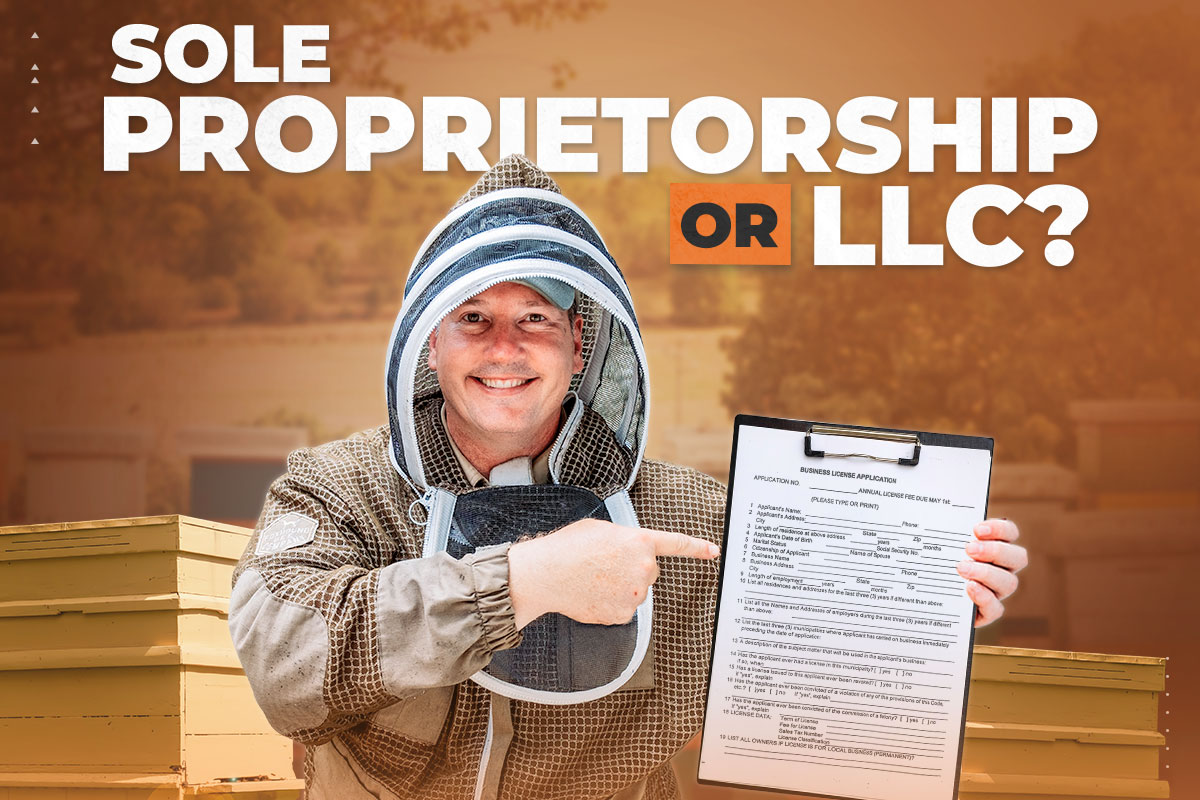When you choose a business structure, you’ll normally consider a sole proprietorship vs. a limited liability company (LLC). A sole proprietorship and a limited liability company both have their places in the business world.
We’re here to help you understand the similarities and differences between a sole proprietorship and an LLC. We’ll explain what you should consider when choosing one business structure over another, when LLCs or sole proprietorships are best, and what they have in common.
We’ll also explore the process of converting a sole proprietorship to an LLC if you need to change the business structure. Get ready for the battle of sole proprietorship vs. LLC!
- What Is a Business Structure?
- Considerations When Choosing a Business Structure
- Sole Proprietorship vs. LLC Features
- LLC vs. Sole Proprietorship: Legal Protection of Personal Assets
- LLC vs. Sole Proprietorship: Formation
- LLC vs. Sole Proprietorship: Taxes
- LLC vs. Sole Proprietorship: Business Income
- LLC vs. Sole Proprietorship: Operations
- LLC vs. Sole Proprietorship: Compliance
- It’s a Tie Between LLCs and Sole Proprietorships
What Is a Business Structure?

According to the Internal Revenue Service you need to decide what type of business entity to form when you start a business. The business structure implicates laws, regulations, and tax codes you have to follow to maintain organizational compliance.
We’ll discuss two of the most popular business types, a limited liability company and a sole proprietorship.
What Is a Limited Liability Company?
State statutes create regulations that allow you to form a limited liability company. Each state will have different regulations, so you should check with your state before starting an LLC.
LLC owners may be individuals, other LLCs, corporations, and foreign entities. The owners are called members and most states do not limit the number of members. You can have a single-member LLC to benefit from the limited liability protection and pass-through taxation.
Foreign LLCs and certain types of businesses like insurance companies and banks may have restrictions on LLC formation.
What Is a Sole Proprietorship?
A sole proprietor is a small business that has a sole owner and the company and the owner are a single entity for tax purposes and liability.
Sole proprietors are best for low risk businesses because the business debts and liabilities are also the personal debts of the business owner. To operate under a brand name you’ll need a DBA (“doing business as”) or fictitious name.
James Hartman, owner of Secret Garden Bees, explained:
Find out why it might complicate converting from an unincorporated business to an LLC or corporation.
Considerations When Choosing a Business Structure
There are a variety of factors you’ll need to consider when choosing between a limited liability company and a sole proprietorship. Some of the most important considerations include:
- The legal protection of personal assets
- Formation of LLC or registering the business as a sole proprietorship
- Treatment of business income
- Tax implications
- The industry
Sole Proprietorship vs. LLC Features
The table below summarizes defining characteristics of choosing a sole proprietorship or LLC.
| Sole Proprietorship | LLC | |
| Formation | Requires business licenses from city and state Must register trade name | Requires articles of organization and business licenses from city and state Must register trade name |
| Management and Operations | Only one owner responsible for all decisions Couples potentially count as sole proprietors (varies by state) | Multiple owners allowed Management can be hired |
| Taxes | Pass-through taxation only | Pass-through taxation (default) Corporate tax filing (optional) |
| Legal Protection | Personally liable | Not personally liable |
| Compliance and Documentation Requirements | Renewing business licenses Paying taxes | Paying taxes Renewing business licenses Filing an annual report Abiding by operating agreement Holding member meetings Recording membership |
| Best Business Structure For | Businesses with employees Businesses with legal risks Subsidiaries Companies with risk of physical injury | Companies without employees Companies without risk of physical injury |
LLC vs. Sole Proprietorship: Legal Protection of Personal Assets
The legal protection for personal assets is the number one reason that most people suggest forming an LLC over a sole proprietorship. When run properly, a single-member LLC will protect both you and your business in ways that a sole proprietorship cannot.
Even if you plan ahead as much as possible, you won’t be able to avoid risk forever. James told us:
Before I continue, none of this is legal advice. I suggest talking to a lawyer to help you create and run an LLC in a way that guarantees these benefits. Liability protection works in the following ways:
- When running an LLC properly, your business assets aren’t personal assets. However, your income and profit can be personal assets if you run your business as a pass-through entity.
- When running an LLC properly, liability protection protects your personal assets from being included when a court considers your business assets. This is only true as long as you were not personally responsible for the behavior that caused the court judgment.
- The debts of the business and any personal debts are separate if you follow the requirements to provide liability protection.
You’re legally protected because the business structure creates liability protection as long as you follow certain rules. Small business owners should be aware of the following practices when seeking legal protection through an LLC:
- Separate accounts: Personal and business banking need to be in separate accounts.
- Your actions: If you personally do something negligent in the course of business, an LLC will not provide personal liability protection.
- Business debt: Personal liability protection prevents you from being held personally liable for any debt to a business creditor.
- Filing as a C corp: A single-member LLC can offer better protection when you opt to follow C corp requirements by filing Form 8832 and adhering to corporate law.
- Insurance: There is insurance that can add additional personal liability protection for LLCs against losses.
Check out this video about when it makes sense to get an LLC:
You can also run a multi-member LLC using the tax code for partnerships or a corporation.
Personal liability protection is of immense benefit, but in some scenarios, it may not be as valuable. If neither the business owner nor the business entity have substantial assets or debts, creating a separate business entity may just create extra work and costs for small business owners. If you fall into this category and operate a low-risk business with no employees, a sole proprietorship may be better.
Looking at this section, LLC takes the win!
LLC vs. Sole Proprietorship: Formation
The business formations of an LLC and a sole proprietorship are substantially different. Let’s look at what the requirements are for each to understand the differences and similarities.
Forming a Sole Proprietorship

A sole proprietorship is registered with the state and will require paperwork for a fictitious name if you wish to run the business as something other than your given name. You’ll also need any state and local business licenses, tax permits, and an employer identification number (EIN) if you wish to have employees.
Some states offer sole proprietorships for free as long as you make under a certain amount. When I am just trying to test the water in a field, I will register for an NV sole proprietorship using the exemption from the state of Nevada that allows people who make less than 66% of the average annual wage to run a sole proprietorship for free.
If you want to be a sole proprietor, check if your state offers this option for sole proprietors.
Let’s look at how an LLC formation differs from a sole proprietorship formation.
Forming an LLC
An LLC will have several main differences including:
- Filing cost
- Ongoing fees
- Operating agreement
- Articles of organization
- Must have an EIN
- Does not need a DBA unless operating as something other than the LLC name
We’ll look at the filing costs, operating agreement, and the articles of organization because they are unique to an LLC.
Filing Cost and Ongoing Fees

An LLC will also have to register with the Secretary of State but will require different applications. This will normally require a fee at the state level. None are over $500 and most are under $300, but you’ll also have to pay ongoing fees that range from $0 annually to $500 annually. The best one you have to pay ongoing fees for is Pennsylvania at $70 every 10 years.
Operating Agreement
An operating agreement is one of the documents that is required for an LLC that a sole proprietorship does not require. An operating agreement includes:
- The creation date
- Location
- Owners and percentages
- Management and voting interests
- Investment in Business
- How profits, losses, and assets, are distributed
- How membership changes are handled is important for a single-member LLC because they may want to pass it on when they die
- How to dissolve the company if there is a desire to close it
- And anything else required by your state
This document will need to be signed and notarized to be legal. Let’s look at the Articles of Organization next.
Articles of Organization

The Articles of Organization are very similar to the operating agreement but need to be submitted to the Secretary of State’s office. They include:
- Company name
- Description of the company
- Mailing address
- Name and address of the registered (or statutory) agent
- Information about company owners, managers, and officers
The most common reason for these to be rejected is they are using a name that has already been taken.
A sole proprietorship wins the round on formation, but there are still plenty of rounds to go. Let’s look at taxes next.
LLC vs. Sole Proprietorship: Taxes
Both sole proprietors and single-member limited liability companies can pay personal income tax on a personal tax return because they are both by default pass-through income. Sole proprietors and limited liability companies acting as a pass-through entity will also have to pay self-employment taxes, which are 15.3% broken into 12.4% for social security and 2.9% for Medicare.
LLCs can also follow the tax code for partnerships if there are two or more members. These are similar to a single-member LLC because they still have to pay self-employment taxes and only file a personal tax return with the Internal Revenue Service. Unlike a sole proprietor, an LLC can also file as a C Corporation or an S Corporation by filling out the appropriate documentation. Read up on LLCs on the IRS website to learn about their tax treatment.
In addition, pass-through LLCs can deduct 20% of net income before being taxed, while a sole proprietor does not have that option.
For anyone wondering “do LLCs pay more taxes than sole proprietorships?”
The answer should be no. The benefit of an LLC from a tax standpoint is the ability to choose whether filing like a sole proprietor or corporation is best for the business owner. This means you should be able to find a way to pay less in taxes.
This round goes to the LLC for their diversity of options when paying taxes. Get ready for the next round, business income.
LLC vs. Sole Proprietorship: Business Income
Business income is treated as personal income for a sole proprietor, but an LLC can either be treated as personal income or corporate income and the business owner as an employee.
The difference can matter in several ways:
- A sole proprietor must claim the income if it isn’t spent on expenses in that year. An LLC filing as a corporation can retain the profits and only pay the 21% tax rate for corporations. This makes the income easier to reinvest than a sole proprietor.
- A limited liability company can pay dividends to the owners, which may create a more favorable tax consequence. A sole proprietorship cannot.
- A limited liability company can borrow money from its owners at a fair market rate, while a sole proprietorship cannot. This allows you to get returns on your investment until it is paid off, which qualifies as interest income for the person and a business expense for the LLC. When the LLC pays off the investor, the original capital is not taxable.
Check out the video discussing how a separate legal entity or sole proprietorship impacts your tax forms:
An LLC definitely has perks that a sole proprietorship doesn’t have when it comes to business income. That means that LLCs take this round.
Sole Proprietor vs. LLC: Franchise Tax
A franchise tax is paying for the right to do business in the state. States have different requirements regarding the franchise tax. The best way to find out the requirements for your state is to talk to the local Small Business Administration. You can find local offices on the SBA website.
At the time of writing, the following states have a franchise tax: Alabama, Arkansas, California, Delaware, Georgia, Illinois, Louisiana, Mississippi, New York, North Carolina, Oklahoma, Tennessee, and Texas. In addition, Washington DC has a franchise tax.
Sole proprietors aren’t subject to this requirement, so they win this round.
LLC vs. Sole Proprietorship: Operations
Sole proprietorships are tied directly to the owner’s personal tax return and the owner has to be involved in the operations of a business. Operations will also end when a sole proprietor dies.
Meanwhile, if your own business is an LLC, you can specify a manager in the LLC operating agreement and collect the profits. When you file articles of organization and the operating agreement, you need to specify how ownership is transferred, making it where an LLC can survive an owner’s death.
Which is better LLC or sole proprietorship? The benefits of an LLC vs. sole proprietorship win out on this one.
LLC vs. Sole Proprietorship: Compliance

When wondering about the benefits of an LLC vs. sole proprietorship, compliance isn’t one of them. Sole proprietorships don’t need a separate bank account for a new business, nor do small businesses have to update the formal business structure of a sole proprietorship.
If you already own a business under a sole proprietorship, you don’t have to register for a new business because both businesses will be tied to the owner’s personal assets. This makes it really easy to try new ideas.
Single-member LLCs will have increased compliance requirements for an LLC owner because they will need to have a separate business bank account, keep the business’s debts separate, business expenses separate, and build a business credit score. Small businesses will also have more filing requirements than sole proprietors.
Compliance is a meaningful difference between LLC and sole proprietorships. In this category, sole proprietorships take the win.
It’s a Tie Between LLCs and Sole Proprietorships
After comparing the differences between an LLC and a sole proprietorship, we come to a 4 – 4 draw. Ultimately, people choose LLCs to put a barrier of protection between themselves and their business liability, but they pay for that liability in additional compliance and filing fees.
In addition, there are potential tax benefits to LLCs that may be of interest once you reach a point in which your taxable consequences are more than 25%. You can change to an LLC later if you want to get started first as a sole proprietor
Whichever you choose, make sure to consider your goals and industry before making the decision. What business structure are you using to start or run a business?






